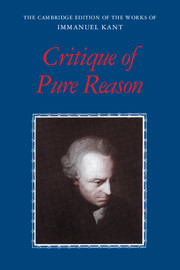Book contents
- Frontmatter
- Contents
- General editors' preface
- Acknowledgments
- Introduction
- Immanuel Kant, Critique of Pure Reason
- I Transcendental doctrine of elements
- Division one. Transcendental analytic
- Book I Analytic of concepts
- Book II Analytic of principles
- Appendix: On the amphiboly of concepts of reflection
- Remark to the amphiboly of concepts of reflection
- Division two. Transcendental dialectic
- II Transcendental doctrine of method
- Editorial Notes
- Glossary
- Index
Division one. Transcendental analytic
from I - Transcendental doctrine of elements
Published online by Cambridge University Press: 05 July 2013
- Frontmatter
- Contents
- General editors' preface
- Acknowledgments
- Introduction
- Immanuel Kant, Critique of Pure Reason
- I Transcendental doctrine of elements
- Division one. Transcendental analytic
- Book I Analytic of concepts
- Book II Analytic of principles
- Appendix: On the amphiboly of concepts of reflection
- Remark to the amphiboly of concepts of reflection
- Division two. Transcendental dialectic
- II Transcendental doctrine of method
- Editorial Notes
- Glossary
- Index
Summary
This Analytic is the analysis
This Analytic is the analysis of the entirety of our a priori cognition into the elements of the pure cognition of the understanding. It is concerned with the following points: 1. That the concepts be pure and not empirical concepts. 2. That they belong not to intuition and to sensibility, but rather to thinking and understanding. 3. That they be elementary concepts, and clearly distinguished from those which are derived or composed from them. 4. That the table of them be complete, and that they entirely exhaust the entire field of pure understanding. Now this completeness of a science cannot reliably be assumed from a rough calculation of an aggregate put together by mere estimates; hence it is possible only by means of an idea of the whole of the a priori cognition of the understanding, and through the division of concepts that such an idea determines and that constitutes it, thus only through their connection in a system. The pure understanding separates itself completely not only from everything empirical, but even from all sensibility. It is therefore a unity that subsists on its own, which is sufficient by itself, and which is not to be supplemented by any external additions. Hence the sum total of its cognition will constitute a system that is to be grasped and determined under one idea, the completeness and articulation of which system can at the same time yield a touchstone of the correctness and genuineness of all the pieces of cognition fitting into it.
- Type
- Chapter
- Information
- Critique of Pure Reason , pp. 201Publisher: Cambridge University PressPrint publication year: 1998



